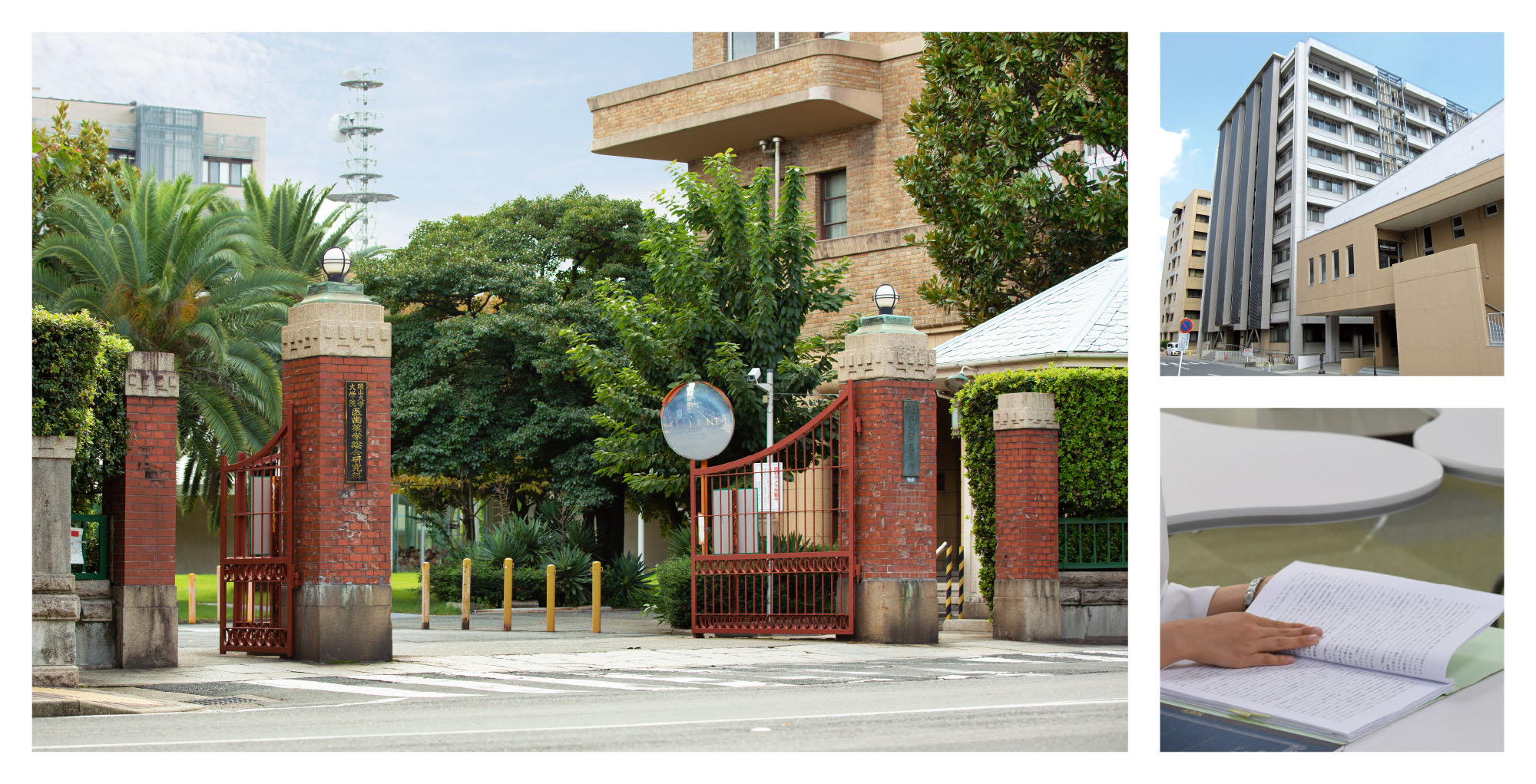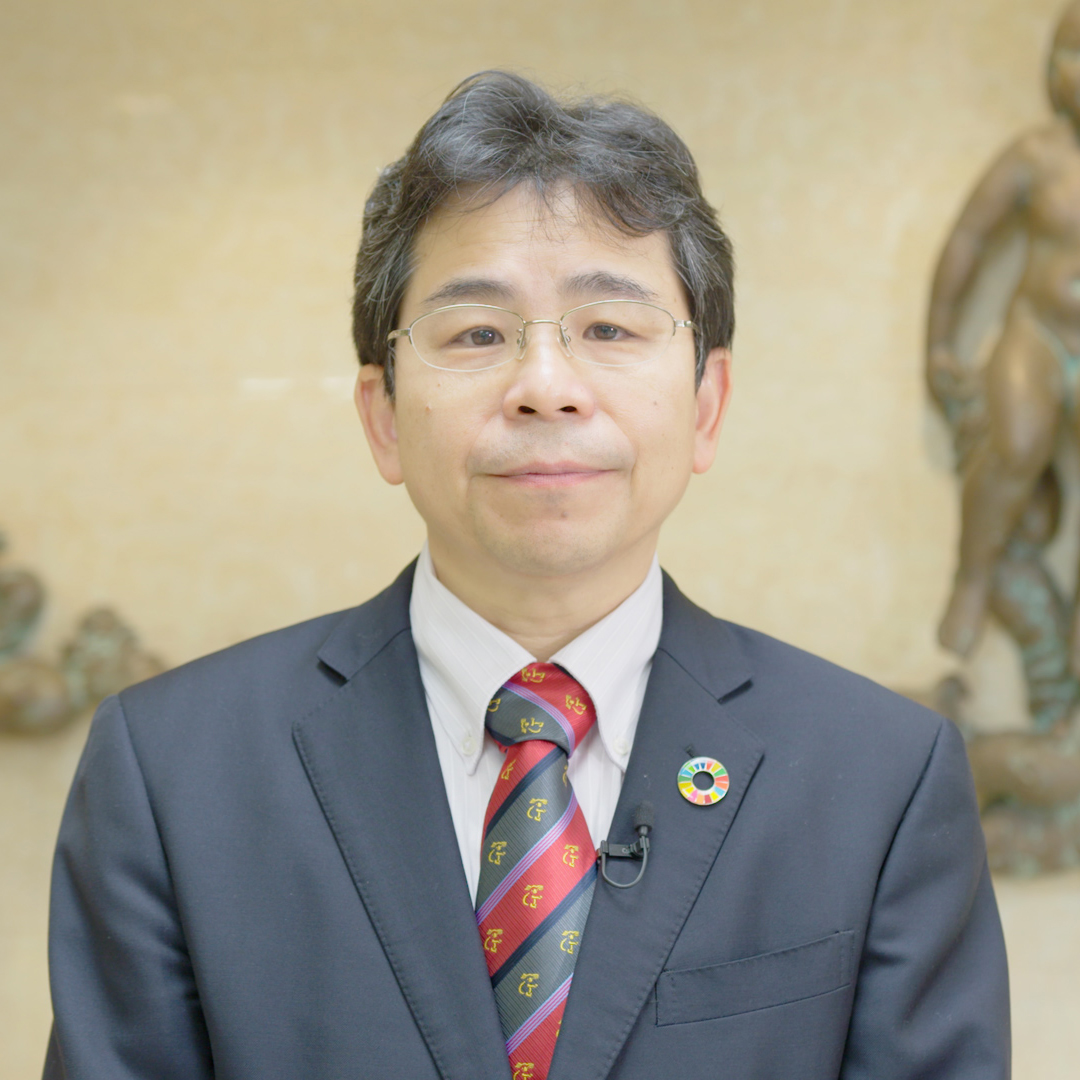About
GRADUATE
SCOOL
OF
HEALTH
SCIENCE
保健学研究科

MESSAGE
Message from the Dean
Dean of the Graduate School
HIROHATA, Satoshi

Since the first news report on the expansion of COVID-19 in China, we have experienced that our daily lives have changed drastically. Now we need to adapt the “New Normal” in this era.
Okayama University is promoting the SDGs (Sustainable Development Goals), aiming to train medical personnel to develop the ability to respond to and solve various problems. We will develop leading human resources to become "intellectual professionals" who can flexibly respond to changes and respond to the needs of society.
At the Graduate School of Health Sciences, Okayama University, we offer various master's programs and train professionals with advanced abilities to support medical care and health. We have launched a midwifery master’s course for the acquisition of national qualifications for midwives, a cancer radiation science master’s course (commonly known as a medical physicist course), and training of genomic medicine scientists. Please see the page of each field for the types of research can be conducted in each field. The Graduate School also has a mission of being a place for recurrent education for people who are active in society. Therefore, we have established a system that makes it easy to take courses while continuing to work as members of society.
In this “new normal” era, we strive to instill the following developmental attributes in our students: "Independence" to decide what to do, motivation to "grow" to achieve one's goals, and "purpose" to contribute to the community and society. It is important to proceed with learning and research with these three developmental attributes in mind. I hope that everyone who studies at the Graduate School of Health Sciences at Okayama University will play an active role not only in Japan, but also on the international stage as a leader in advanced medical care.
HISTORY
History of the Graduate School
In April 2003, the Okayama University Graduate School of Health Sciences established the Graduate School of Health Sciences Master’s Course (major in Health Sciences: Nursing (14 students), Radiological Technology (6 students) and Medical Technology (6 students)). Then in April 2005, the Graduate School established the new Graduate School of Health Sciences Master’s Course (major in Health Sciences: Nursing (14 students), Radiological Technology (6 students) and Medical Technology (6 students)) and the Doctor’s Course (major in Health Sciences: total of 10 students in Nursing, Radiological Technology and Medical Technology).
The graduate school views “health promotion” as the target principle of its master’s course, with “holistic care” and “team care” as its educational principles. Viewed globally, the pursuit of such principles and other activities for scientific and practical development and enrichment of such principles are, in an academic sense, still in their early stages. Thus it is urgent that graduates be nurtured with even more advanced skills and expertise to serve as leaders in practice, research and education in this area. To meet these social needs, the graduate school aims to create an advanced curriculum that pursues these principles. It aims to nurture educators and researchers who can contribute to establishing a highly specialized medical profession and expertise.
The Doctor’s course nurtures educators and researchers able to carry out research and development on programs, systems, equipment and technologies related to health, medicine and welfare, based on expertise in each area of nursing, radiological technology and medical technology. Another aim of the Doctor’s course is for these independent researchers to achieve “health promotion based on inter-professional work.” “Inter-professional work” is coordination and cooperation between professionals from different fields who join forces to work together, transcending the confines of their own profession. Students go through a process of exploring issues and learning from each other, on their way to the common goal of health promotion. Nurses, radiological technologists, medical technologists and other students with different educational backgrounds, such as medicine, welfare studies, engineering, science and social science, learn the significance and methodology underlying inter-professional coordination and cooperation.
Okayama University has been a key contributor in the “Regional Training Program for Oncology Professionals in the Chugoku-Shikoku Area: Training of Oncology Professionals in Charge of Team Medical Care,” a Training Plan for Oncology Professionals under the auspices of the Ministry of Education, Culture, Sports, Science and Technology (MEXT), which was adopted in FY2007 following a joint application submitted together with eight universities in the Chugoku-Shikoku Area. At the Graduate School of Health Sciences, students actively participate in co-medical training courses related to cancer treatment (Certified Nurse Specialists in Cancer Nursing, Medical Physicists, etc.).
The Graduate School of Health Sciences also highlighted “Training of Co-Medical Professionals with Clinical Research Skills” as an education and research project. In particular, we help working graduate students to improve their clinical research skills. In addition, every autumn, the Graduate School of Health Sciences organizes an “Open Forum” to present domestic and international trends and policies concerning the health sector, and to introduce distinctive research and education being carried out by teaching staff and graduate students.
GOALS
Educational Principles and Goals
【Master’s Course】
Healthcare professionals working directly with people’s life, lifestyle and health-related problems must have wide and deep expertise and advanced skills, a rich sense of humanity, high ethical standards and sensitivity to people’s needs. It is their mission to participate in activities promoting good health in ways that integrate medicine, health and welfare to allow people to lead healthy and fulfilling lives, while emphasizing respect for human dignity and life.
To this end, the graduate school views “health promotion” as its target principle, with “holistic care” and “team care” as its educational principles. “Holistic care” is based on high ethical standards and a love for humanity. Healthcare professionals demonstrate a comprehensive understanding of the health problems of individuals. They understand biological problems, and also issues of people living in a group as social beings. They accurately understand the health, medicine and welfare related issues of the individuals, their families and communities. To deal with these issues, they provide care based on the latest specialized skills and knowledge.
“Team care” is healthcare professionals interacting and cooperating harmoniously with professionals in other fields when working on health promotion. Each person provides expertise as a member of the team, and exercises leadership at times. Team care is readily accepted by people, and can be deployed most effectively.
Viewed globally, the pursuit of such principles and other activities for scientific and practical development and enrichment of such principles are, in an academic sense, still in their early stages. Thus it is urgent that graduates be nurtured with even more advanced skills and expertise to serve as leaders in practice, research and education in this area.
To meet these social needs, the graduate school aims to create an advanced curriculum that pursues these principles. It aims to nurture educators and researchers who can contribute to establishing a highly specialized medical profession and expertise.
【Doctor’s Course】
Japan’s healthcare environment has changed greatly since the start of the 21st century. For example, dramatic progress in life sciences has led to increasingly advanced and sophisticated medical care; Japan’s rapidly declining birthrate and aging population have led to changes in social structures and disease patterns; and there is greater public awareness of health maintenance and health promotion. To respond flexibly to these changes, there is an urgent need to develop human resources in the field of health sciences, who have a good education, sense of humanity and advanced expertise.
To deal with these conditions, the Faculty of Health Sciences was established at Okayama University Medical School in October 1998, and the Graduate School of Health Sciences Master’s Course (Major in Health Sciences) was established in April 2003. Along with the Doctor’s course established later, the plan is to develop graduates with more advanced skills, expertise and development abilities, to serve as leaders in practice, research and education in health sciences.
The aim of health sciences is to achieve integrated health and medical care which combines health, medicine and welfare, while emphasizing the dignity of human life. To this end, foundations for learning and research in nursing and health sciences need to be established based on positive evidence. Researchers and educators need to be nurtured who are sensitive to patient needs and family needs, and have high ethical standards, ability to make comprehensive judgments, advanced expertise and practical skills. Accordingly, the Graduate School of Health Sciences Doctor’s course nurtures educators and researchers able to carry out research and development on programs, systems, equipment and technologies related to health, medicine and welfare, based on expertise in each area of nursing, radiological technology and medical technology. Another aim of the Doctor’s course is for these independent researchers to provide “health promotion based on inter-professional work.”
“Inter-professional work” is coordination and cooperation between professionals from different fields who join forces to work together, transcending the confines of their own profession. The concept of health promotion is the process of enabling individuals to control and improve their own health. Coordination and cooperation between different professions is critical for activities supporting health and the ability to control it. In particular, to take part in activities promoting health in a way that integrates medicine, health and welfare, it is important to establish interaction and cooperative relations among many professionals. It is also necessary to nurture professionals who can carry out creative research and education while developing interdisciplinary interaction with people in other fields, making the most of their respective expertise. At the same time, by adopting a basis of inter-professional work with a view to achieving health promotion, we can develop the unique identity of the Graduate School of Health Sciences comprised of three disciplines.
The Doctor’s course requires students to complete “Inter-Professional Work” as a core subject shared by each specialized field: nursing, radiological technology and medical technology. Students go through a process of exploring issues and learning from each other, on their way to the common goal of health promotion. Nurses, radiological technologists, medical technologists and other students with different educational backgrounds, such as medicine, welfare studies, engineering, science and social science, learn the significance and methodology underlying inter-professional coordination and cooperation. This aims to develop diverse perspectives among students, cultivate new ideas not tied to a specific area of study, and foster abilities to think logically and creatively.
ADMISSION POLICY
Admission Policy
【Master’s Course】
The Graduate School of Health Sciences seeks prospective students who:
● have a basic knowledge of health and medical care, a rich sense of humanity, and a superb sensitivity
● have a passion and strong will to contribute to the improvement of people’s health and well-being
● possess a spirit of cooperation, think flexibly, and have the potential to become a core member in team medical care in the future
● aspire to acquire a high degree of professional skills and expertise in health, medicine and welfare, and in related fields
● aspire to acquire fundamental research skills for the purpose of engaging in the development of equipment, technologies and education programs
【Doctor’s Course】
The Graduate School of Health Sciences seeks prospective students who:
● possess a sensitivity to see through to the essence of people and things
● have broad-mindedness and can look at issues comprehensively from several angles, and who possess the temperament to lead health and medical teams in the future
● have fundamental research skills and an inquiring mind for the truth, and who have the potential to promote establishment of health promotion science
● aspire to become researchers and educators in the area of health, medicine and welfare
● aspire to be active and make contributions internationally in the area of health, medicine and welfare
